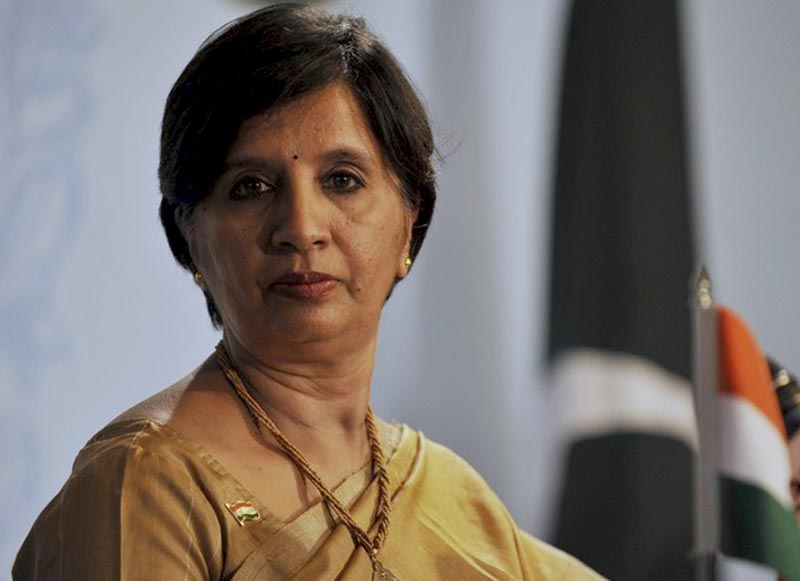 Dharamshala: A group of 21 young Tibetan artists, intellectuals, writers, translators and activists living in Dharamshala has presented a letter titled "memorandum" to Ms Nirupama Rao, the Foreign Secretary of India on her visit to Dharamshala this weekend.
Dharamshala: A group of 21 young Tibetan artists, intellectuals, writers, translators and activists living in Dharamshala has presented a letter titled "memorandum" to Ms Nirupama Rao, the Foreign Secretary of India on her visit to Dharamshala this weekend.
"Some of us were born and raised in India, while others have escaped from Tibet and have since then lived on this side of the Himalayas. We welcome you to Dharamshala as you arrive with the fresh rain of the monsoon," the group said in thier letter.
"When Tibetans first sought asylum in India, following the footsteps of our leader His Holiness the Dalai Lama, the Tibetan freedom struggle was in its formative phase; there was neither international awareness nor was there political education and understanding within the Tibetan community. It was the kindness of India and her people, opening the doors of their homes to us, who made it our second home," the letter said.
In their letter, the group said, "Today, after 50 years of being in exile, Tibetan youngsters grow up in India like most young Indians with a modern education and outlook, but we are always aware of our identity and responsibilities towards our struggle and our leader His Holiness the Dalai Lama. It is partly because of India's support of our cause that the Tibetan struggle not only survived the difficult period but got resurrected to this level of international awareness, and confidence within the struggle. We are grateful to the government and people of India. Please accept our deepest gratitude."
"The Tibetan struggle is not just to find a temporary arrangement for the exiled Tibetans to return home, but to seek a long-term interest for the survival of the Tibetan people and the nation. And therefore whatever may be the policies held by His Holiness the Dalai Lama and the exile government, we believe very strongly that the goal of the struggle cannot be anything less than Independence. Only an independent Tibet can guarantee the survival of the Tibetan people, our culture and the nation. The 2008 uprising in Tibet is a clear public mandate that the Tibetans in Tibet are willing to even die, but not to live under Chinese colonial rule," the group stated in the letter.
"We understand that His Holiness the Dalai Lama - the Buddha that he is - is guided by his universal concern and therefore he has not been insistent on the independence of Tibet, and the exile government's policy of seeking autonomy within China is bound by its relationship with the Government of India, which still supports the One China policy."
"The difference in the political stands between His Holiness and us doesn't divide us on our belief in Nonviolence. The Tibetan freedom struggle is based on the Buddhist principles of nonviolence, and when we hit the streets with our direct action campaigns we are inspired by Mahatma Gandhi's Satyagraha."
"We understand that the Government of India is dealing with the People's Republic of China as a neighbour today. We are also aware that the Indian government still holds its decades old policy on Tibet stating, " The Autonomous Region of Tibet is a part of the People's Republic of China", and that this has not been reviewed while there are mounting Chinese military, political and environmental pressures on India," they added.
The group also said that, "Between the 1947 achievement of Indian independence and the 1949 Chinese invasion of Tibet, India and Tibet shared two years of friendly relationship as independent nations. So long as China continues its occupation of Tibet, India will never be able to solve its border issues amicably with China. Therefore we urge you to take this petition to the Government of India - our plea for a review of India's policy towards Tibet. Only by recognizing the historical independence of Tibet - with whom the Himalayan borders were decided through bilateral treaties - can India validate its legal and historical claim over its Himalayan states which have been challenged time and again by the People's Republic of China."


![Tibet has a rich history as a sovereign nation until the 1950s when it was invaded by China. [Photo: File]](/images/stories/Pics-2024/March/Tibet-Nation-1940s.jpg#joomlaImage://local-images/stories/Pics-2024/March/Tibet-Nation-1940s.jpg?width=1489&height=878)















